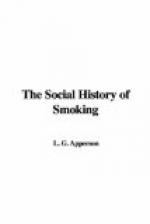Deacon, as the title of his book just quoted shows, was very fond of alliteration, and one sentence of his diatribe may be quoted. He warned his readers that tobacco-smoke was “very pernicious unto their bodies, too profluvious for many of their purses, and most pestiferous to the publike State.” Much may be forgiven, however, to the introducer of so charming a term of abuse as “profluvious.” Deacon’s book takes the form of a dialogue, and after nearly 200 pages of argument, in which the unfortunate herb gets no mercy, one of the interlocutors, a trader in tobacco, is so convinced of the iniquity of his trade, and of his own parlous state if he continue therein, that he declares that the two hundred pounds’ worth of this “beastly tobacco” which he owns, shall “presently packe to the fire,” or else be sent “swimming down the Thames.”
Many good folk would seem to have associated smoking with idling. In the rules of the Grammar School at Chigwell, Essex, which was founded in 1629, it is prescribed that “the Master must be a man of sound religion, neither a Papist nor a Puritan, of a grave behaviour, and sober and honest conversation, no tippler or haunter of alehouses, no puffer of tobacco.” A worthy Derbyshire man named Campbell, in his will dated 20 October 1616, left all his household goods to his son, “on this condition that yf at any time hereafter, any of his brothers or sisters shall fynd him takeing of tobacco, that then he or she so fynding him, shall have the said goods”—a testamentary arrangement which suggests to the fancy some amusing strategic evasions and manoeuvres on the part of the conditional legatee and his watchful relations.
A converse view of smoking may be seen in Izaak Walton’s “Life” of Sir Henry Wotton, who died in 1639. Walton says that Wotton obtained relief to some extent from asthma by leaving off smoking which he had practised “somewhat immoderately”—“as many thoughtful men do.” The italics are mine.
Tobacco, as has been said, was praised as well as abused extravagantly. Much absurdity was written in glorification of the medicinal and therapeutic properties of tobacco, but a more sensible note was struck by some lauders of the weed. Marston wrote in 1607:
Musicke, tobacco, sacke
and sleepe,
The tide of sorrow backward
keep.
An ingenious lover of his pipe declared ironically in the same year that he had found three bad qualities in tobacco, for it made a man a thief (which meant danger), a good fellow (which meant cost), and a niggard ("the name of which is hateful"). “It makes him a theefe,” he continued “for he will steale it from his father; a good fellow, for he will give the smoake to a beggar; a niggard, for he will not part with his box to an Emperor!” A character in one of Chapman’s plays, 1606, calls tobacco “the gentleman’s saint and the soldier’s idol.” A little-known bard of 1630—Barten Holiday—wrote a poem of eight stanzas with chorus to each in praise of tobacco, in which he showed with a touch of burlesque that the herb was a musician, a lawyer, a physician, a traveller, a critic, an ignis fatuus, and a whiffler, i.e. a braggart. The first verse may suffice as a specimen:




